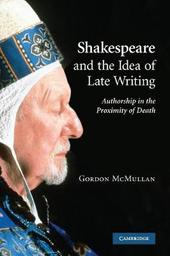
|
Shakespeare and the Idea of Late Writing: Authorship in the Proximity of Death
Paperback / softback
Main Details
| Title |
Shakespeare and the Idea of Late Writing: Authorship in the Proximity of Death
|
| Authors and Contributors |
By (author) Gordon McMullan
|
| Physical Properties |
| Format:Paperback / softback | | Pages:416 | | Dimensions(mm): Height 229,Width 152 |
|
| Category/Genre | Literary studies - general |
|---|
| ISBN/Barcode |
9780521158008
|
| Classifications | Dewey:822.33 |
|---|
| Audience | | Professional & Vocational | |
|---|
| Illustrations |
Worked examples or Exercises
|
|
Publishing Details |
| Publisher |
Cambridge University Press
|
| Imprint |
Cambridge University Press
|
| Publication Date |
19 August 2010 |
| Publication Country |
United Kingdom
|
Description
What do we mean when we speak of the 'late style' of a given writer, artist or composer? And what exactly do we mean by 'late Shakespeare'? Gordon McMullan argues that, far from being a natural phenomenon common to a handful of geniuses in old age or in proximity to death, late style is in fact a critical construct. Taking Shakespeare as his exemplar, he maps the development of the 'discourse of lateness' from the eighteenth century to the present, noting not only the mismatch between that discourse and the actual conditions for authorship in early modern theatre but also its generativity for subsequent projections of creative selfhood. He thus offers the first critique of the idea of late style, which will be of interest not only to literature specialists but also to art historians, musicologists and anyone curious about the relationship of creativity to old age and to death.
ReviewsReviews of the hardback: 'Gordon McMullan's Shakespeare and the Idea of Late Writing is easily the best critical study of Shakespeare to appear this year. Packed with insights both theoretical and historical - and ranging from Edmond Malone to Henry James to Edward Said - it's the kind of book that literary scholars (as well as art and music historians) will want to keep close at hand.' James Shapiro, Columbia University and author of 1599 'Inevitably, the book raises many questions, some explicit and others by implication. ... the very openness to questioning is one of the book's strengths, alongside its deft handling of an extensive and surprisingly diverse range of ideas, its refusal to follow a single intellectual path, and the skill with which it moves across disciplinary boundaries. It also demonstrates an elegance and modesty too often lacking in many discussions of complicated ideas. All this, and its open-mindedness, make it a very provocative, and a very important, book.' English Studies
|